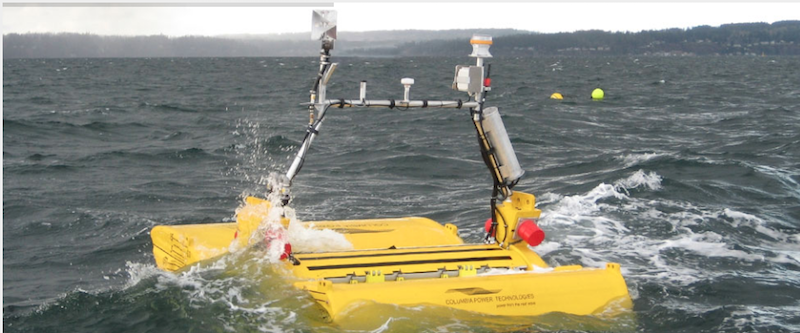The U.S. Department of Energy (DOE) announced Tuesday that it has selected $25 million in research projects for next-generation marine energy devices. Funded by DOE’s Office of Energy Efficiency and Renewable Energy Water Power Technologies, these 12 innovative projects will reduce capital costs and accelerate the innovation cycle by testing new concepts. Marine energy includes ocean wave power, tidal, and river/ocean current devices that convert movement of water into electricity.
“Advancing next-generation marine energy will help the U.S. ensure a secure, reliable, and enduring supply of American energy,” said Undersecretary of Energy Mark Menezes. “These early-stage research and development projects are key to the development of water power as part of DOE’s ‘all-of-the-above’ energy strategy.”
As a global leader in marine energy research, DOE supports its potential to provide reliable power at grid scale, expand the resilience of our nation’s energy systems, provide economic development opportunities, and revitalize coastal and port infrastructure.
Selections were made across three topic areas, outlined below. The first two aim to address fundamental scientific and engineering challenges of generating power from dynamic, low-velocity and high-density waves and currents. The third topic area is targeted to provide better information to reduce the costs and time to permit projects.
Early Stage Device Design Research
- Oscilla Power Inc. of Seattle will demonstrate the effectiveness its wave energy converter through open-ocean scaled testing in partnership with the University of Maine.
- Atargis Energy Corporation of Pueblo, Colo.. will advance its wave energy converter through numerical simulations at the model scale, as well as 1:20 scale wave tank tests.
- Columbia Power Technologies Inc. of Charlottesville, Va., will design and test a prototype low-power wave energy converter that reduces costs and provides a quickly deployable mobile power system for maritime sensors, monitoring, and communications equipment.
- Littoral Power Systems Inc. of Fall River, Mass., will improve on its turbine design to increase power, reduce costs, and test a fully integrated subscale prototype that is ready for pilot site installation.
- University of Hawaii at Manoa of Honolulu will advance its wave energy converter concept and conduct testing in the open ocean.
- North Carolina State University of Raleigh, N.C., will develop integrated numerical models and open water experimental prototypes for an energy-harvesting ocean kite system.
- Texas A&M University of College Station, Texas, will develop and test a scaled prototype of its surface-riding wave energy converter which will be ready for open-sea testing at the end of the project.
- Florida Atlantic University of Boca Raton, Fla., will develop and prototype a low-flow marine current turbine to provide partial power to recharge battery banks onboard an unmanned mobile at-sea recharge station for aerial drones and potentially other unmanned marine vehicles.
Controls and Power Take Off Design Integration and Testing
- Portland State University of Portland, Ore., will demonstrate a newly-invented adjustable magnetic spring that allows for greater power adjustability and controllability.
- CalWave Power Technologies Inc of Berkeley, Calif., will improve on its sub-scale prototype by integrating a new control architecture to improve costs and efficiency.
- AWS Ocean Energy Inc. of Wilmington, Del., will optimize a prototype hydraulic/electrical system and demonstrate performance in a laboratory environment.
Dissemination of Environmental Data and Analyses to Facilitate the Marine Energy Regulatory Process
- Kearns and West of San Francisco will develop a marine and hydrokinetic energy environmental permitting toolkit that includes a spatial, regulatory, and document database of information. The project will address the complexities of permitting processes through a consolidation and dissemination of relevant and actionable information needed for efficient permitting.
Reducing costs, accelerating technology development, and decreasing testing and development timelines of marine energy technologies will help unleash the nation’s potential for future growth in marine energy resource extraction. DOE is committed to investing in early-stage R&D that enables the domestic marine energy industry to advance toward becoming more cost competitive while also helping to promote economic prosperity and energy security.
For more on the Water Power Technologies Office, visit its website HERE.




